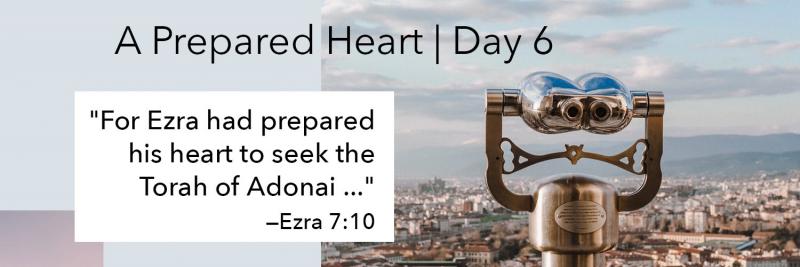
“Therefore tell them, thus says Adonai-Tzva'ot, 'Return to Me' – it is a declaration of Adonai-Tzva'ot – 'and I will return to you,' says Adonai-Tzva'ot.”
—Zechariah 1:3
The prophets had spoken to the Jewish people of Judah and now as exiles in Babylon:
- Return to Jerusalem! Check
- Rebuild the Temple! Check
- Return to the Lord! Check
Things are looking good for the Jewish people of the 5th and 6th centuries. Better than they've looked in a long time.
Yet by the time we reach the end of Ezra-Nehemiah, things start to tank. The exiles have returned to Jerusalem, yes, but because of their behavior Nehemiah fears the will be kicked out once again (Nehemiah 13:18). Though they renewed the covenant to return to the Lord and keep His commandments, observe the Shabbat, not intermarry with those who served other gods and not to neglect the Temple, all of their promises come up empty and are broken once again.
Now that's disappointing. This is the place on the page when our hope starts to dwindle. What does this mean regarding the promises of God? Are the words of the prophets powerless? Were they even true? Before we go down that road, remember that the words God gave to His prophets often told about events in the current time, near future and a time even further in the future. They are always pointing us forward, but what were they pointing us forward to?
Jeremiah 31: 30-33 gives us a glimpse:
“Behold, days are coming”
—it is a declaration of Adonai—
“when I will make a new covenant
with the house of Israel
and with the house of Judah—
not like the covenant
I made with their fathers
in the day I took them by the hand
to bring them out of the land of Egypt.
For they broke My covenant,
though I was a husband to them.”
it is a declaration of Adonai.
“But this is the covenant I will make with the house of Israel after those days”
—it is a declaration of Adonai—
“I will put My Torah within them.
Yes, I will write it on their heart.
I will be their God
and they will be My people.
No longer will each teach his neighbor
or each his brother, saying: ‘Know Adonai,’
for they will all know Me,
from the least of them to the greatest.”
it is a declaration of Adonai.
“For I will forgive their iniquity,
their sin I will remember no more.”
A new covenant. Great! They just entered into a new covenant in Nehemiah 10. Yes, well basically they committed again to keeping the covenant God gave them through Moses, which they never had great success at keeping. And let's be honest here, neither have we.
So, what is Jeremiah talking about, “a renewed covenant?” No, He says, a NEW covenant, not like Moses' covenant. A covenant, the terms of which are that I will take their sins and remember them no more and I will write my Law on their hearts. Not one where I throw out the Law but now I engrave it on their hearts by my Spirit and empower them to do it. But there is one thing more they need, a NEW HEART.
We know that Jeremiah was speaking of the work of Yeshua here, right? He was the Messiah, the deliverer who would come and accomplish for His people what they couldn't accomplish for themselves. He would take their hearts of stone and give them a heart of flesh (Ezekiel 36:26). Good, so this is the end of the story, right?
Oh, and one more thing, "No longer will each teach his neighbor or each his brother, saying, ‘Know Adonai, for they will all know Me, from the least of them to the greatest’" (Jeremiah 31:33). Hmmm…that doesn't sound like the way things are now, does it? We still have teachers and are still learning from them about who God is, aren't we? Yeshua said, "The Holy Spirit will teach you everything and remind you of everything that I said to you" (John 14:26). Still, Paul reminds us that we only know in part (1 Corinthians 13:9). Now you may ask, are you sure Jeremiah 31 wasn't completely fulfilled when Yeshua came? My friends, don't forget that the story doesn't end with Yeshua's first coming. He is returning to establish His forever Kingdom. In Revelation 21:3, John points us to a future time when God is with us as our light. We definitely won't need anyone to teach us then, will we? We will all know Him for He will be in our midst!
Let's look again. After Yeshua ascended to Heaven (Acts 1:9), what events followed that He predicted (Luke 21:24)? Fast-forward to 70 A.D. The Temple was destroyed, and the Jewish people were once again exiled, only this time we called it "dispersed." Then what began to happen in the 20th century? Jewish people began to return to the Land promised to Abraham after one of the greatest atrocities in human history, the Holocaust. The State of Israel is reborn in 1948 and Jerusalem becomes the fledgling nation’s capital in 1967 (Isaiah 66:8, Ezekiel 37:1-14). But I thought the words of these prophets were foretelling the return of Jewish exiles from Babylon. Yes. Were they also speaking of a future exile and return? Yes. Remember 3-part harmony from Day 1 of this devotional series? God's plan is always layers deep, a beautiful tapestry of sound, so much deeper than we're discussing even now.
Here is the 3-part harmony we're hearing in this section of the Ezra-Nehemiah story:
- Return to the Land
- Return to Me
- I'll return to you
Return to Me and I'll return to You. The Lord was speaking this to the Jews coming out of exile. He was saying it in 1948. He is still speaking this to Jewish people today. When will Yeshua return and fill Jerusalem with His glory? In essence, He says, I will return to Jerusalem, when Israel returns to Me and says, "Blessed is He who comes in the Name of the Lord" (Matthew 23:39).
Reflection:
- Have you ever thought about Jesus returning to the earth when the Jewish people return to Him? What does that stir up in you?
- Ask the Lord to reveal His heart to you for His people to return to Him.
















